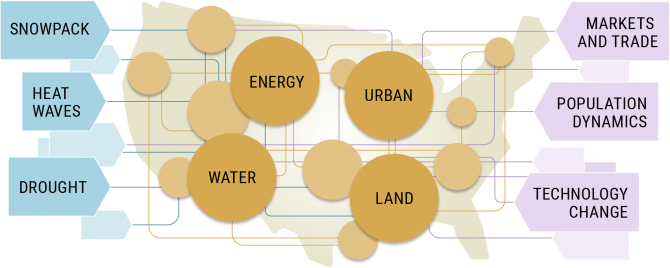News directly from Cornell's colleges and centers
Reed awarded $1.4M grant to advance human-natural system modeling
By Syl Kacapyr
A Cornell engineer is advancing the field of ‘multi-sector dynamics’ with a new $1.4 million grant from the U.S. Department of Energy that will focus on techniques for better projecting the outcomes of human interactions with the natural world.
Patrick Reed, the Joseph C. Ford Professor in the School of Civil and Environmental Engineering, received the grant in collaboration with the Pacific Northwest National Laboratory’s Integrated Multisector Multiscale Modeling project.
As scientists and policy makers increasingly turn toward mathematical modeling to help inform their decision making, the project aims to better predict how human systems – such as the economy, urbanization, technology, and agriculture – co-evolve with Earth systems, such as climate, natural resources and wildlife.
For example, Reed’s prior research has modeled how the complex dynamics between snowmelt, reservoirs, and water rights affect the availability of irrigation water to farmers in the Yakima River Basin, and how hydropower dams constructed along the Mekong River affect ecological systems.
Reed said the core objectives of the new grant include:
- Developing flexible, open-source, and integrated modeling capabilities that capture the structure, dynamic behavior and emergent properties of the multiscale interactions within and between human and natural systems.
- Using these capabilities to study the evolution, vulnerability and resilience of interacting human and natural systems and landscapes from local to continental scales, including their responses to the compounding effects long-term influences and short-term shocks to natural and socioeconomic systems.
- Advancing the understanding the implications of uncertainty in data, observations, models, and model coupling approaches for projections of human-natural system dynamics.
Reed’s Decision Analytics for Complex Systems Research group has leadership roles in the project’s uncertainty-modeling efforts, as well as growing the MultiSector Dynamics Community of Practice.
“We want to promote a deep integration across scientific disciplines, where new modes of analysis can rapidly emerge and be synthesized into decision relevant insights,” said Reed. “Accelerating our ability to make these insights is critical for societal systems that are facing acute shocks while simultaneously trying to deal with the pressures from long-term changes.”
Media Contact
Get Cornell news delivered right to your inbox.
Subscribe

